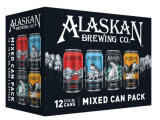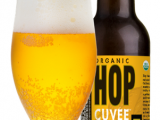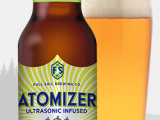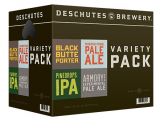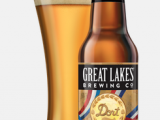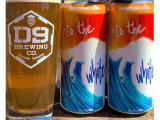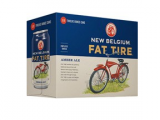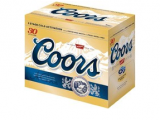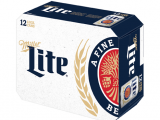Chris Ponzi is a writer, poet, environmentalist, and student of ecology dedicated to restoring and healing our natural world, inside and out.
By Chris Ponzi
Love a great beer and want to know that the money you spend on it will go to a brewer that shares your values?
I've spent more than 30 hours researching the policies of the brewers that make the best of the beers that are widely available in the US -- and give you my picks for great beers from the leaders on each of the social issues Ethical Mom covers.
Best Socially Conscious Beer Overall - Fat Tire Ale from New Belgium Brewing Company
Company Rating: 84 *
No company is perfect and most companies do everything they can to suppress that fact, while New Belgium is the first to admit what they’re doing wrong in big bold red letters (seriously) -- along with how they want to fix it.
Their transparency on all levels of their business is unparalleled to any other I assessed, as even a quick look at their Sustainability report on their website attests.
They also deserve recognition for:
-- leading in all of the places that green brewers can;
-- being female inclusive (if not centric) from their beginning;
-- promoting positive communities centered around the needs of the people in them -- with biking as an organizational structure for that.
Best Beer for the Environment - Fat Tire Ale from New Belgium Brewing Company
Company Rating: 84 *
Many of the beer companies we surveyed deserve praise for their environmental stewardship. Of the mid-sized and larger brewers, New Belgium Brewing stands out as a true environmental leader.
Water:
Beer requires massive amounts of water - first to grow the hops and barley used to produce it and then in the brewing of the beer.
On average, growing the barley and hops to make just one gallon of beer requires 590 gallons of water!
New Belgium Brewing takes water issues into account in sourcing barely and hops. 12% of New Belgium's hops are sourced from Salmon Safe Certified farms, a certification program which helps guide farmers on healthy practices to protect the Pacific Northwest waterways.
New Belgium also captures rainwater to offset its use of water in brewing and founded the Save the Colorado nonprofit which seeks to “restore the Colorado River and its tributaries from the source to the sea”.
In 2008, New Belgium was the first brewery to join 1% for the Planet, an international organization whose members contribute at least one percent of their annual sales to environmental causes.
Soil:
New Belgium is keenly aware of the negative effects farming practices can have on soils, and is actively seeking ways to mitigate negative impacts on the farms it sources barely and hops from. It has a stated desire of switching to organic barley and hops, but hasn't done so yet given the cost differential and its belief that consumers won't support the higher prices that need to go with organic ingredients. We hope that our own effort to encourage consumers to "put their wallets where their hearts are" will help change that.
To note: two breweries featured below, Peak Organic and Bison Organic, are to be praised and supported for using 100% organic ingredients - though they don't brew beer on the scale that New Belgium does.
Non-GMO:
New Belgium is a leader in the effort to ensure that non-GMO varieties of barely and hops remain available and is supportive of campaigns to require labeling of GMO products.
Monculture:
The World Wildlife Fund recently released a study about how the loss of global agricultural diversity is severely impacting, well, everything:
“Seventy-five percent of the global food supply comes from only 12 plant and five animal species”. Monoculture agriculture contributes to habitat loss, greenhouse gases, and the lack of biodiversity weakens plant and soil life immunity, thus needing more pesticides and chemicals. Barley is on that list of 12 crops we overly rely upon, along with wheat.
New Belgium is focused on this issue and recently released its “Hemperor HPA” which is a hemp-based beer, in one attempt to diversify the beer industry’s dependence on monoculture agriculture.
Energy:
New Belgium was the first fully wind-powered brewery in the U.S. and their facilities have on-site power generation in the forms of biogas that is created by their water treatment process, as well as solar energy. Its Asheville, North Carolina facility has earned 3 LEED Certifications.
New Belgium fully owns (in big red letters) that its operations produce greenhouse emissions and that it still utilizes fossil fuels in its business––brewing facility, distribution, and agriculture. New Belgium has a number of initiatives, some complete and others in process, to drastically reduce its carbon footprint.
Waste:
New Belgium is a Platinum Certified Zero Waste Business and diverts 99.9% of its waste from landfills. All of its many millions of pounds of spent grain (grain leftover after brewing the beer), is sold to local farmers as feed, and a small percentage of its organic material is composted.
Best Beer for Women's Equality and Reproductive Rights - Fat Tire Ale from New Belgium
Company Rating: 84 *
The Babylonians believed that the goddess Nin-Kasi taught mankind the secret of brewing. According to an article in The Atlantic, around 4,500 years ago in Ancient Egypt, the oldest known record of beer brewing confirmed something interesting . . . that beer was made and sold almost entirely by women. That female “Brewster” tradition continued all over the world and here in America, where women were typically the family brewers of the households.
Things shifted in the 20th century, however, and now beer brewing is an extremely male-centric, and often beard-heavy, profession, along with its consumer base, and is probably more well-known as an industry for objectifying women to sell men its beer versus making it.
In a 2016 Gallop poll, 54% of surveyed American men said their preferred alcoholic beverage is beer, while only 23% of women said beer was their main preference. In the industry, a 2014 study conducted by Auburn University found that women account for 29% of brewery workers in the United States. Also in 2014, a study by Stanford University found that out of 1,700 active breweries surveyed, only 4% had a female head brewer or brew master, and of 2,500 breweries surveyed found that 21% had at least one woman in a leading role.
Things are changing and women are definitely taking a growing role in the beer world, but it is undeniably not the most diverse of industries.
Given these statistics, it may come as a surprise to some that New Belgium Brewing was co-founded by once social worker, Kim Jordan, who was its former CEO, is still its Executive Chair, and is a pioneer in the craft beer industry. She was honored in 2018 in Conscious Company Media’s “30 World-Changing Women.”
“We have been very heavy on female leadership since the beginning,” said Michael Craft. The company’s HR Director and Sustainability Director are also women.
“We have females in every department,” added Sara Fraser.
A close second for this selection is Lady Justice Brewing, a philanthropic community supported brewery in Colorado. All their profits over cost from their beer sales are donated to Colorado-based community organizations through a grant-making process that promotes the status and opportunities of women and girls. Lady Justice was co-founded by three women: by Kate Power, Betsy Lay and Jen Cuesta. However, it was not considered for the top position because it is still a small regional brewery operation.
Best Beer for LGBTQ+ Equality - Miller Lite, Fosters, Grolsch and Henry Weinhard's from MillerCoors
Company Rating: 84 *
MillerCoors is a juggernaut in the American and global beer world, and it would be surprising if any beer drinker hadn’t tried at least one of their long list of beer companies which include: Miller, Coors, Molson, Blue Moon, Colorado Native, Foster’s, Killian’s, Grolsch, Hamm’s, Henry Weinhard’s, Keystone, Lech, Leinenkugel’s, Mickey’s, Milwaukee’s Best, Olde English, Old Vienna, Pilsner Urquell, Red Dog, Saint Archer, Sharp’s, Steel Reserve, Terrapin and Tyskie.
For such a large company, it might be surprising to learn that MillerCoors has been a long-time staunch supporter of LGBTQ equality, within its company and without.
In 2016, MillerCoors was awarded the 2016 Corporate Equality Award from the Human Rights Campaign (a report that rates workplaces on lesbian, gay, bisexual, transgender, and queer equality), and has received a 100 percent rating on the HRC Corporate Equality Index for the past 15 years. They were the first company in the alcohol beverage industry to provide domestic partner benefits and donated a total of $300,000 toward LGBTQ nonprofit organizations in 2017.
MillerCoors has a “Tap Into Change” program, which donates a portion of the proceeds from sales of MillerCoors products to local LGBTQ and HIV/AIDS nonprofit organizations. “The program first started in Chicago six years ago and has since expanded to 16 cities across the country through their partnership with the Equality Federation. The program has raised more than $175,000 for local charities.”
MillerCoors also partners with the Mathew Shepard Foundation to support the Stay Proud Be Loud program, which are nation-wide events that help to build awareness and help prevent hate crimes against LGBTQ individuals. “The program features a roundtable to discuss the impact of hate crimes and how to increase reporting and prevention.” For those of you who aren’t familiar with Episcopalian Mathew Sheppard’s peaceful, loving existence or his horrifying murder, there’s a very moving article here on his recent internment at the National Cathedral.
View video of tributes to Matthew Shepard given at his internment at the National Cathedral
Other medium-scale brewing companies of note for LGBTQ support are Odell Brewery and the Brooklyn Brewery. Odell Brewery supports A Queer Endeavor, “an initiative focused on supporting teachers and school communities around topics of gender and sexual diversity.” Brooklyn Brewery has brewed their own beer called “The STONEWALL IPA” to celebrate the legendary Stonewall Inn’s history in the LGBTQ community and to support the continuing work of The Stonewall Inn Gives Back Initiative.
Best Beer Company for Gun Control - D9 Brewing Company
Company Rating: 79 *
The relationship between the beer world and guns is a tricky one, and research yielded very few breweries and brew companies that were tackling the issue of guns or gun control on any front. However, the D9 Brewing Company launched a limited-supply American Ale beer called the “314 Action Ale” to support 314 Action, a pro-science advocacy nonprofit committed to getting scientists more involved in politics. The beer is part of “an awareness campaign to repeal the Dickey Amendment, an anti-science piece of legislation passed by Congress in 1996 to prevent scientists at the CDC from studying gun violence. In addition to raising awareness, proceeds from the batch will go entirely toward the Stoneman Douglas Victims’ Fund.
The Stoneman Douglas Victims’ Fund is a fund that is distributing the millions of dollars donated to the survivors and families of those killed in the February 14th mass shooting at Marjory Stoneman Douglas High School in Parkland, Florida.
Founded by two engineers and a doctor, D9’s focuses heavily on “scientific exploration of the natural world” to “inspire and support community through the creation of exciting and original crafted beers.”
Best Beer Company Promoting a Just and Civil Society - New Belgium Brewing Company
Company Rating: 84 *
Promotion of a Just and Civil Society in the context of this article means doing well by employees and their dependents, doing well by vendors and suppliers, and supporting healthy vibrant communities. While New Belgium Brewing’s environmental zeal is fierce, they have also gone above and beyond to support healthy social causes.
New Belgium donates $1 for every barrel of beer they sell to a diverse portfolio of nonprofits. Over the years, the company has donated over $16 million to over 50 nonprofits. They offer each coworker $500 to participate in a volunteer vacation every year, and they have logged 22,282 volunteer hours of coworker volunteer time since 2010. They throw big beer fundraising events like the annual Tour De Fat and one-off events like the Military Appreciation Drive, amongst others. They have a long list of the groups they have helped over the years, which you can see here.
New Belgium Brewing is a certified B-Corporation that is 100% employee owned, which means they all share in the profits. New Belgium also has generous insurance and wellness programs for team members. It's not surprising then, that the company has a 92% employee retention rating.
“Whenever a guest buys a six-pack of fat tire,” says Sara Fraser, “you feel like really thanking them because that directly benefits all 700 of us working at this company. . . It’s putting food on the table and kids through college.”
“The bicycle, perhaps man’s greatest invention next to beer,” said Michael Craft, in my interview with him. This, along with the famed Fat Tire Beer bicycle label, hints at the company’s love of bicycles and bicycle advocacy. The company has distributed over $600,000 to bicycle advocacy nonprofits, donated land for cycling, and encourages all their employees to cycle . . . a lot. After one year of work, employees get a special edition cruiser bicycle. Outside Magazine voted them a best place to work and they were voted #1 in Bicycle Magazine’s Best places to work for cyclists.
How cool is that?
Other Top Socially Conscious Beer Companies
Sierra Nevada
Company Rating: 80 *
Sierra Nevada is a stand out among beer makers for its commitment to sustainability and zero waste.
In 2005, Sierra Nevada brewing company was given the California Governor’s Environmental and Economic Leadership Award for Sustainable Practices.
Sierra Nevada designed its Mills River, California facility to achieve LEED Platinum certification by including nearly 2,200 photovoltaic solar panels and innovating in a number of ways in its design - creating a model for her to build a carbon friendly brewing facility.
Brewery Vivant
Company Rating: 82 *
Brewery Vivant was awarded the very first LEED certification for a production brewery in 2012 and they are also one of the first breweries to receive B-Certification.
In addition:
-- 1% of sales go to local charities
-- 50% of ingredients are grown within 250 miles
-- water usages is kept to an impressively low 3 to 1 water to beer ratio.
Deschutes Brewery
Company Rating: 82 *
Drawing its name from the Deschutes River, Deschutes Brewing earned the 2016 Sustainability Award by the Business Intelligence Group.
The Brewery has been working with the Deschutes River Conservancy every year since 2012, claiming to restore one billion gallons of water into the Deschutes River.
You can feel good about drinking a Deschutes.
Full Sail Brewing
Company Rating: 82 *
Hoisting the sails on the seas, Full Sail Brewing cares about water. With one of the lowest water to beer ratios in the industry, they use about 3 gallons of water for every beer, compared to the 6 to 10 of other breweries. While this may not seem like a big deal, when you’re brewing millions of gallons of beer . . . it adds up! They also recapture hot water in the brewery, saving a little over 3 million gallons a year.
Full Sail sources almost 99% of their ingredients from local or regional suppliers. Full Sail supports alternative energy initiatives, sponsors community building projects, works to reduce carbon emissions and supports a greener, more just world in a number of other ways.
Alaskan Brewery
Company Rating: 84 *
Alaskan Brewery, brewed in Alaska (a duh moment), has coined the phrase “beer powered beer.”
Without getting into the technical stuff, Alaskan Brewery has installed some very cool equipment that essentially allows them to take the “waste” of their beer brewing process and recycle it right back into the beer brewing process–a closed loop system! This isn’t just cool, it’s downright genius and has a powerful positive impact on the environment.
Peak Organic
Company Rating: 82 *
Another top contender, Peak Organic is one of the few somewhat large breweries using only organic ingredients. They are also farmer centric. Their commitment to local, sustainable, and organic farming practices has helped keep 205,775 lbs (93.45 tons) of toxic, persistent pesticides and chemicals out of the soil. That translates to a lot of wildlife and land being saved!
In 2012, Peak Organic received a Sustainability Large Business award through the Environmental Centre, In 2015, its Portland Pub received an honorable Gold Certification through the City of Portland Sustainability at Work program.
What are the Green Tech/ Green New Deal Plays?
Glass Recycling
Recycling and many of the technologies that go with it are certainly not new, but that doesn't mean there isn't room for significant innovation, especially in key recycling niches for particular types of materials. In fact, there is room for massive investment at almost every level of recycling, from better recycling technologies to better program design and execution.
Sierra Nevada Brewing Co., New Belgium Brewing, Allagash Brewing Company, Heineken USA and other brewers are members of the U.S. Glass Recycling Coalition, an industry partnership launched in the spring of 2016 with the aim of improving the glass recycling process and increasing the frequency of glass recycling.
The coalition aims to “help build a foundation to make glass recycling a successful industry, and an efficient, high-quality, and convenient service consumers want and expect,” according GPI.
While glass containers for food and beverages are 100 percent recyclable, many still end up in landfills. Glass recycling isn't easy to do and some communities have removed glass from their recycling programs. As a result, green opportunities are missed and large brewers can have difficulty procuring enough recycled glass to meet their manufacturing needs.
The coalition seeks to change all that through a variety of ways, including adoption of new recycling processes and the creation of additional economic incentives, to ensure that brewers that want to use recycled glass can have access to the glass they need.
Is There RoundUp in my Beer?
One of the big hairy beasts of non-organic anything is the wide-spread herbicide Glyphosate, known as the weed killer “Roundup” by Monsanto. Studies suggest that Roundup may cause cancer in humans. A recent study tested 20 wines and beers and found traces of Glyphosate in 19 of the 20.
The official report for the study stated that the amounts were so small that they were extremely unlikely to affect human health. Others disagree though, and say that even a small amount of the chemical can have negative effects.
Most consumers think of Roundup as a weed killer and wouldn't imagine it intentionally being applied to food crops meant for their consumption, but it is actually intentionally applied in conventional grain farming to speed up the death of plants that have reached maturity for harvest - allowing for faster and more complete drying.
Roundup isn't compatible with the malting required for beer production, so it isn't typically used in that fashion on barely planted for beer.
“Nobody that produces or purchases malted barley wants glyphosate in the barley because it’s counter-productive to what we need barley for,” said Sarah Fraser, Employee Owner and Sustainability Specialist for New Belgium Brewing. “We may purchase NON-GMO barley, but it’s possibly grown adjacent to fields where there is GMO barley or there is glyphosate being applied. . . when glyphosate gets sprayed its susceptible to being picked up by the wind and drifting onto other crops.”
“We are very much not in favor of having glyphosate show up there,” said Michael Craft, Employee Owner and Community Ambassador for New Belgium. “That [glyphosate] is being epically monitored now after that study came out,” and “the entire craft industry is affected by that stuff.”
How We Did Our Research
As always, we believe it’s critical to be completely transparent about how we do our research here at SweetScore. I have not personally visited these brewing facilities or their agricultural operations, and so I have relied upon the company’s self-reported information on their websites, their documentation trails and certifications, additional research sources from environmental and social websites, and in some cases the company’s representatives themselves whom I reached out to and communicated with by phone or e-mail.
I skype-interviewed with Michael Craft, Employee Owner and Community Ambassador at New Belgium Brewing, and Sarah Fraser, Employee Owner and Sustainability Specialist at New Belgium Brewing. We discussed the various facts and initiatives mentioned in this article, both for accuracy and comment. Not everything we discussed made it into this piece due to length concerns.
I spent approximately 25 hours researching the mid-sized craft brewing industry as a whole and evaluating and choosing a list of top 20 companies based on our categories. From there, a fairly detailed analysis was done on each based on what I termed “critical criteria” for environmental (water, soil, energy, waste) and evidence-based initiatives for the social categories.
Once my decisions had been made in each category, the companies were then collectively evaluated and vetted by the SweetScore staff, who provided their own insights, research, and feedback.
* As of Date of Publication of this Review
